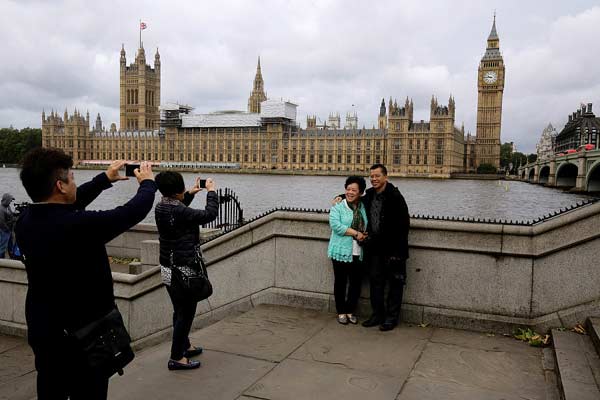
The Wall Street Journal comments: "China has revised the way it measures the size of its economy, the first such change since 2002, in what it says is an effort to better align its data with international standards. The country's National Bureau of Statistics unveiled the revisions in a statement posted on its website Friday, three days before the release of its closely watched gross domestic product data for the second quarter. The adjusted framework for calculating GDP—approved last week by China's cabinet, the State Council—includes the addition of the health-care, tourism and 'new, emerging economy' industries, the bureau said. The new economy typically refers to those companies that are in the high-technology sector or considered to be environmentally friendly. The bureau didn't say whether the changes would be reflected in the GDP figures set for release Monday."
- Forbes reports: ""Far from showing signs of abating, the dispute between India and China at the tri-junction of India, Bhutan and China -- known as the Doklam plateau -- appears to be ramping up. It began more than three weeks ago when the People's Liberation Army (PLA) attempted to build a road in a disputed border area, prompting the Indian military to intervene. For China, India is no longer the debt-ridden neighbor that can be easily kowtowed. The two nations stand on a more equal footing than even before and are now at loggerheads over the border region -- neither side has shown any sign of backing down."
The Washington Post comments: "When the Nobel committee awarded Liu Xiaobo, who died Thursday in China, the Peace Prize in 2010, Fang Lizhi, the Chinese astrophysicist dissident, wrote from exile in America that the award challenged the West to re-examine a dangerous notion that has become prevalent since the 1989 massacre: that economic development will inevitably lead to democracy in China. The Nobel award also challenged something else, and that was the idea, popular among many Western academics, businessmen and strategists, that rebels such as Liu were outliers from mainstream Chinese culture. While Americans took Soviet and South African dissidents such as Andrei Sakharov and Nelson Mandela seriously, their Chinese counterparts never got the recognition they deserved. China had no tradition of liberal thought or democracy, went the argument... Liu belonged to a rich tradition of Chinese liberal thought that argued that if China wanted to rediscover its greatness it had to value individual freedom and rights as it modernized. Many of these men and women were educated in the United States and for decades in the early 20th century they represented the conscience of their nation. But like Liu, many of these liberal thinkers had a difficult relationship not only with their government but also with Westerners who belittled their influence."
- 2017-07-13 China June exports, imports higher than expected as global demand holds strong
- 2017-07-12 China sends troops to Djibouti, establishes first overseas military base
- 2017-07-11 China says 'China responsibility theory' on North Korea has to stop
- 2017-07-10 Three PLAN Officers May Have Just Revealed What China Wants in the South China Sea
- 2017-07-09 China prepares fresh round of state-orchestrated megamergers
- 2017-07-07 If Trump wants China to solve the North Korea problem, he has to cater to Beijing's interests
- 2017-07-06 China could export a recession to everyone else, says ex-IMF chief economist Kenneth Rogoff
- 2017-07-05 After North Korea missile, Trump tweets: 'So much for China working with us'
- 2017-07-04 US confirms ICBM was tested by North Korea as Russia and China play peacekeepers
- 2017-07-03 China's Bond Market Is Attractive for the Wary
- The Wall Street Journal China Changes How It Calculates GDP for First Time Since 2002
- The New York Times Cinese Citizens Evade Internet Censors to Remember Liu Xiaobo
- The Washington Post Germany focuses on fate of Liu Xiaobo's wife
- Reuters Asserting sovereignty, Indonesia renames part of the South China Sea
- CNBC Chinese spy ship reportedly lurking off coast of Alaska, watching anti-missile test
- CNN U.S., China neck-and-neck in global (un)popularity contest, poll finds
- Reuters 'Get used to it' China says as it flies bombers near Japan
- Reuters China cautions Botswana over Dalai Lama visit
- Verge China may not be blocking VPNs after all
- CNN Why China is buying the world's seeds
- Financial Times Strict environmental fules hit luxury carmakers' China shipments
- The New York Times Canadian Nursing Home Deal Spurs Questions About Chinese Money
- Quartz China's ignorance about its own maps created a false history of its ancient role in South Africa
- The Washington Post Liu Xiaobo showed the world that China has a great tradition of liberal thought
- Forbes Neither Side Is Likely To Back Down From China-India Border Standoff
- The New York Times Liu Xiaobo's Fate Reflects Fading Pressure on China Over Human Rights
- National Interest Today's Chinese Foreign Policy is All Business
- Foreign Policy Possible New Sanctions, White House Gets Serious on China's North Korea Ties
- Forbes These 4 Countries Will Stop China From Ruling A Disputed Sea
- American Thinker Pressure China with student visas
